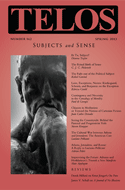At the beginning of his 1961 study The Death of Tragedy, George Steiner claimed that Christian “optimism” contributed to the demise of tragic drama in modernity. The ensuing chapters of The Death of Tragedy actually offer a more nuanced account, though, in which Steiner finds tragic potential in the doctrine of original sin. In subsequent essays, Steiner has doubled down on his claim that tragedy must be bleak. Indeed, he now holds up an ideal of hopeless “absolute tragedy.” In these later writings, Steiner has also continued to show interest in original sin, even claiming in a 2004 essay that original sin is the core of tragic art.
|
Steven Knepper’s “Seeing the Countryside: Behind the Pastoral and Progressivist Veils” appears in Telos 162 (Spring 2013). Read the full version online at the Telos Online website, or purchase a print copy of the issue in our store. One basic account of modernity holds that we are leaving behind a rural past for an urban future. Some see in this account a story of decline. A golden age is passing. We are spiraling into a soulless, dystopian future full of alienation and excess. Others see in this same basic account a story of progress. We are leaving behind a backward age of rural idiocy for an enlightened age of increased choice and prosperity. Some see a simple narrative of decline, others a simple narrative of progress. Yet these pervasive narratives are flip sides of the same coin. They share the premise of a vanishing countryside. |
||||
|
Telos Press Publishing · PO Box 811 · Candor, NY 13743 · Phone: 212-228-6479 Privacy Policy · Data Protection Copyright © 2025 Telos Press Publishing · All Rights Reserved |
||||
 Building upon the work of Raymond Williams, this essay questions the lack of critical scrutiny given to the countryside and its cash crop monocultures. It holds that simple narratives of decline and progress contribute to this strange invisibility. Simple narratives of decline often contrast an idealized countryside and an insidious city, drawing a pastoral veil over the problems and economics of the actual working countryside. Simple narratives of progress often suggest that we have left the countryside behind entirely. When they do acknowledge continuing agricultural realities, they display what Vandana Shiva calls a “monoculture of the mind.” They present contemporary agribusiness as the only way to feed the world, thereby deflecting critical attention. In order to truly see the countryside and its centrality to modernity, this essay suggests we must draw back the pastoral and progressivist veils.
Building upon the work of Raymond Williams, this essay questions the lack of critical scrutiny given to the countryside and its cash crop monocultures. It holds that simple narratives of decline and progress contribute to this strange invisibility. Simple narratives of decline often contrast an idealized countryside and an insidious city, drawing a pastoral veil over the problems and economics of the actual working countryside. Simple narratives of progress often suggest that we have left the countryside behind entirely. When they do acknowledge continuing agricultural realities, they display what Vandana Shiva calls a “monoculture of the mind.” They present contemporary agribusiness as the only way to feed the world, thereby deflecting critical attention. In order to truly see the countryside and its centrality to modernity, this essay suggests we must draw back the pastoral and progressivist veils. 

